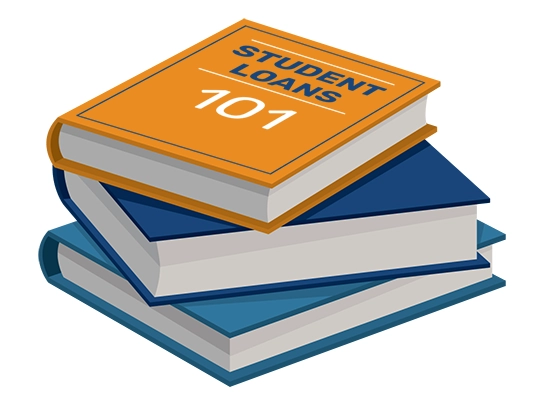Student Loans 101: Everything You Need to Know
 by: holli casto
by: holli casto
vp of training and development
Published 6/19/2024
Student Loan Basics
With the June 30th deadline for submitting the Free Application for Federal Student Aid (FAFSA) quickly approaching, if you have a college student going to school soon, or a rising senior, be sure you're familiar with these student loan basics. It's important to know the ins and outs of student loans, from understanding what happens when you submit your FAFSA, to what happens when you're in school, and what happens to your loans when you graduate.

What is the FAFSA?
To qualify for any federally funded aid, including grants or loans, students must fill out the FAFSA. Furthermore, most schools and private scholarship programs use the FAFSA to make decisions about funding. Even if you think you won't qualify for loans or other scholarships that use FAFSA information, you should fill it out and apply anyway.
The FAFSA determines how much federal student aid a student is eligible for. This includes need-based and non-need-based aid. The FAFSA uses information like the student's income and assets, and the parent's income and assets to calculate what is called your Student Aid Index. This is a number that the FAFSA estimates you will have available to pay for college. The Student Aid Index is used by your college or university, along with individual scholarship programs, to determine your need-based aid.
What "financial need" is and how it affects you
Need based aid, as determined by the FAFSA, is the cost of attendance at your college or university, with your Student Aid Index subtracted out. So, if your total tuition, or Cost of Attendance, is $10,000, and your Student Aid Index is $7,000, then your need is $3,000. This is because, based on the information provided in the FAFSA, you will not have the contributions available from your or your parent's assets and income beyond the $7,000 to pay for the additional $3,000.1
Need based aid includes funding like Pell Grants, Federal Supplemental Educational Opportunity Grants, Federal Direct Subsidized Loans, and Work Study Programs. These programs tend to be less costly options. Grants do not need to be repaid at all. Need based federal loans do not accrue interest while students are in school.
Non-need based aid includes federal direct unsubsidized loans, federal PLUS loans, and TEACH grants. The big difference between these non-need based loans is that interest accrues while in school, so if nobody is paying toward the interest, it will get added to the principal balance of the loan.
The school's financial aid office will provide options that may include non-need based aid options in their financial aid package. Most federal loans are eligible for forgiveness.
Do I have to make payments toward student loans while in school?
Federal loans don't require payments to be made while the student is in school. Interest does not accrue on need based loans, or subsidized loans. As mentioned above interest does accrue on non-need based loans, or unsubsidized loans, while the student is in school and it will be added to the principal balance of the loan if the interest isn't paid while in school. Both subsidized and unsubsidized loans give the borrower six months after graduation to start making payments on the loan. Furthermore, payments can be deferred under certain circumstances.
What types of repayment plans are available for student loans?
Once the student graduates, there are several options available regarding repayment, deferment, forbearance, and forgiveness.2
Repayment
Students can choose repayment options based on income or a fixed payment amount. There are several different income-driven repayment plans. Income-driven repayment plans may qualify for forgiveness under certain circumstances.
Deferment
Deferment is available based on qualifying events like attending college or graduate school, even part time, being in the military, experiencing unemployment, or going through cancer treatment. Subsidized loans will also not accrue interest while deferring payments during grad school. Unsubsidized loans will accrue interest while payments are deferred.
Forbearance
Forbearance is another option available if you're experiencing financial hardship or other difficult life circumstances, or you're on track for loan forgiveness. Circumstances that allow for forbearance include a reduction in income, being in medical residency, being on track for loan forgiveness through the Department of Defense or Teacher Loan Forgiveness, or you're in the National Guard.
Forgiveness
There are some cases where you may qualify for student loan forgiveness after you've worked in a certain field or meet other qualifications. Teachers in low income schools, Government Employees at the Federal, State, Local and Tribal level, and Non Profit Workers may qualify for student loans. Furthermore, if you become totally and permanently disabled, you may qualify for forgiveness. You may also qualify for forgiveness if you've elected for income driven repayment and have been in repayment for 20 or 25 years.3
Federal versus Private Loans
Completely separate from the above loans and subject to their own financing regulations are private loans. Private student loans are through private lenders and don't require you to fill out FAFSA, but will require you to pass a credit check. These loans are not need based and tend to have higher rates than federal loans. Private loans are not eligible for forgiveness.
This is just the tip of the iceberg when it comes to the complexities of student loans. Determining how you're planning to pay for school is complicated and unique to each student. Know your options and do your research to make sure you're setting yourself up for success throughout your entire loan process.




